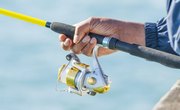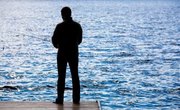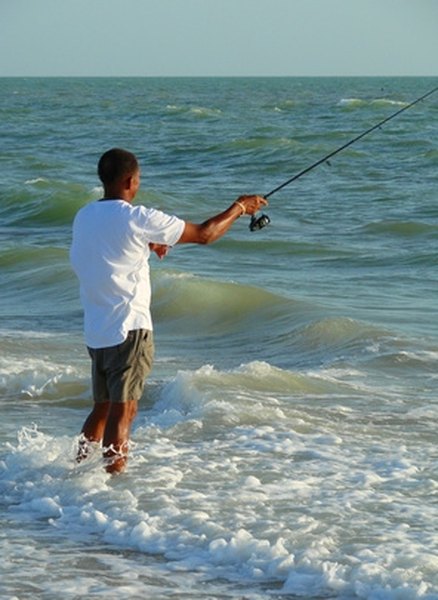
Surf fishing in the Bahamas is cheap and hassle free, but it is not always easy. No license or permit is required to fish from a beach, dock or pier in the islands, and fishing from land means you can take breaks and soak up the sun in a beach chair whenever you want. The only major fishing obstacle is the surf itself; waves and strong currents can adversely affect your bait presentation. Experienced surf fishermen develop long and well-targeted casts and work with---not against---the current. Popular places to fish from shore and in the surf in the Bahamas are Abaco and Eleuthera.
Fish
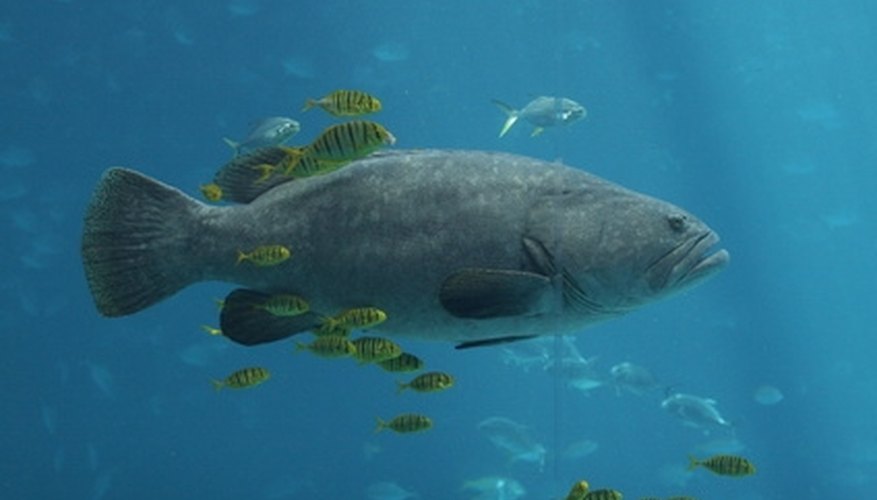
grouper image by Earl Robbins from Fotolia.com
Bonefish, barracuda, pompano, jacks and grouper are among the fish you can catch from a beach in the Bahamas. Bonefish average 3 to 10 lbs., though some can grow to be 15 lbs. They are difficult to approach as they will sense your presence immediately, and they are very fast. Barracuda are also extremely fast and you are likely to find them anywhere there are bonefish since they feed on them. They have long bodies and razor-sharp teeth; larger barracuda can grow to be 25 lbs. and over 6 feet long. Pompano are flat fish that can often be found feeding on the ocean surface close to shore. They swim in schools and average 10 to 12 lbs. Jacks are typically 15 lbs., and they are easiest to catch at night. Grouper tend to stick to barrier reefs but surf fishermen have been known to get lucky around docks and rock piles; they can grow to be 3 feet and 5 lbs. and they are quite tasty.
Bait and Tackle
Surf fishing rods are long and durable; a typical surf fishing rod is 8 or 9 feet. A 9-weight fly fishing rod can also be effective in calmer waters. Spin rods should be equipped with an 8- to 12-lb. test line, and fly rods should be reeled with floating lines. As many of these fish have sharp teeth, leaders are important; steel leaders should be used if you are targeting barracuda. Small shrimp, crabs, squid, worms and bits of snail can be effective baits, as can flies tied with tan, pink, pale gold and white patterns.
Tips
Surf fishing requires long casts to get your lure, bait or fly to where the fish are; they will not be anywhere near the wading fisherman. Casting long distances can be difficult, especially if you lack much experience. Some surf fishermen rock their line like a pendulum to gain momentum before casting. Work to present your sinking baits at depths of 2 to 4 feet, and try and get them there at a six count; use dumbbells or bead chains to increase sink rates if you need to.
Considerations
If you are not a resident of the Bahamas you will be traveling with your fishing gear, likely by plane. To protect your rod, pack it in a rod carrier; if you don't have one you can make one out of PVC pipe. If you are traveling with a tackle box or bag, make sure you check it in with your luggage; pointed hooks and other sharp objects are not permitted in carry-on luggage. When selecting dates to surf fish in the Bahamas keep the seasons in mind; hurricane seasons are especially applicable to this region.
Warning
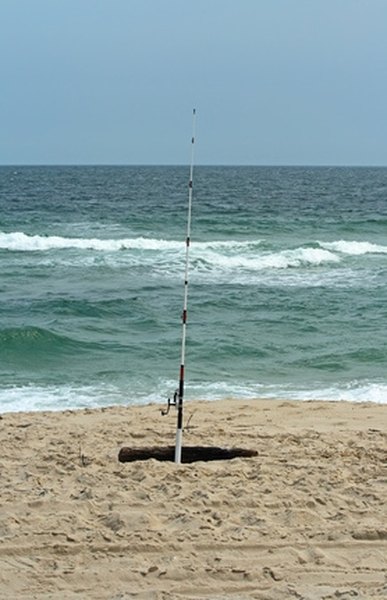
Surf Fishing image by Julianna Olah from Fotolia.com
Where there are bonefish there are sharks, so be careful when wading out into the surf, and have a look around when you've snagged a fish to see if you have any competition for the prize. Sand can wreck your reel and salt can corrode your rod, so be sure never to lay your rod down in the sand or surf. Bring a sand spike to hold your rod vertically when you are breaking, and gently wash your gear down with fresh water when you're done for the day.
References
Writer Bio
Based in Ottawa, Canada, Chris Wolski started writing professionally for non-governmental organizations in 2007. He has written communications material for marketing firms and small businesses, and he has published articles for various websites. Wolski received a national coaching certification in 2001 and a Master of Arts in political science from York University in 2007.

